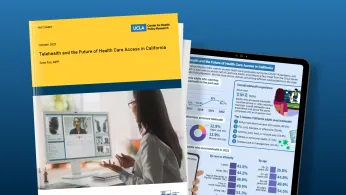Publications Menu
Traffic-Related Air Pollution and Parkinson's Disease in Central California (Environmental Research)
Researchers investigated the long-term impacts of traffic-related and multiple sources of particulate air pollution on Parkinson's Disease in central California. They assessed exposure at residential and occupational locations from 1981 to 2016, estimating annual average carbon monoxide (CO) concentrations.
Traffic-Related Air Pollution and Parkinson's Disease in Central California (Environmental Research)
Researchers investigated the long-term impacts of traffic-related and multiple sources of particulate air pollution on Parkinson's Disease in central California. They assessed exposure at residential and occupational locations from 1981 to 2016, estimating annual average carbon monoxide (CO) concentrations.
Office of Climate Change and Health Equity (OCCHE) created the Climate and Health Outlook, a publication series to inform health professionals and the public on how our health may be affected in the coming months by climate events and to provide resources for proactive action.
Office of Climate Change and Health Equity (OCCHE) created the Climate and Health Outlook, a publication series to inform health professionals and the public on how our health may be affected in the coming months by climate events and to provide resources for proactive action.
Authors describe awareness about the modified “public charge” rule among Oregon’s Mexican-origin Latino/a population and if concerns about the rule influenced disenrollment from state-funded programs.
Authors describe awareness about the modified “public charge” rule among Oregon’s Mexican-origin Latino/a population and if concerns about the rule influenced disenrollment from state-funded programs.
Acculturation, the adaptation of beliefs or behaviors to a new culture, may influence immigrants’ engagement in family planning. Using 2015–2020 CHIS population data, researchers examined the association between acculturation level and contraceptive decision-making.
Acculturation, the adaptation of beliefs or behaviors to a new culture, may influence immigrants’ engagement in family planning. Using 2015–2020 CHIS population data, researchers examined the association between acculturation level and contraceptive decision-making.
Using 2022 California Health Interview Survey (CHIS) data, this fact sheet outlines the current status of telehealth adoption among California adults, identifies disparities, and presents recommendations to maximize telehealth’s benefits in reducing health disparities outcomes.
Using 2022 California Health Interview Survey (CHIS) data, this fact sheet outlines the current status of telehealth adoption among California adults, identifies disparities, and presents recommendations to maximize telehealth’s benefits in reducing health disparities outcomes.
The aim of this scoping review was to assist researchers who want to use survey data, either in academic or community settings, to identify and comprehend health disparities affecting Native Hawaiian (NH), Pacific Islander (PI), and/or Filipino populations, as these are groups with known and numerous health disparities. The scoping review methodology was used to identify survey datasets that disaggregate data for NH, PI, or Filipinos.
The aim of this scoping review was to assist researchers who want to use survey data, either in academic or community settings, to identify and comprehend health disparities affecting Native Hawaiian (NH), Pacific Islander (PI), and/or Filipino populations, as these are groups with known and numerous health disparities. The scoping review methodology was used to identify survey datasets that disaggregate data for NH, PI, or Filipinos.
While mental health needs are on the rise for all Californians, low-income adults continue to experience distress at higher rates than middle and high-income adults. For California’s low-income undocumented adults, finding help to address trauma can also mean working around barriers to care.
While mental health needs are on the rise for all Californians, low-income adults continue to experience distress at higher rates than middle and high-income adults. For California’s low-income undocumented adults, finding help to address trauma can also mean working around barriers to care.
Using 2019–2020 CHIS data, authors examine loneliness and social media use and its association with severe psychological distress among older adults and whether social media use moderated the association of loneliness on severe psychological distress among older adults.
Using 2019–2020 CHIS data, authors examine loneliness and social media use and its association with severe psychological distress among older adults and whether social media use moderated the association of loneliness on severe psychological distress among older adults.
This issue brief uses data from the 2021 California Health Interview Survey (CHIS) to explore how telehealth use varies across subpopulations of adults in the state and reports how people rate their telehealth experience compared to in-person care. The brief concludes with a discussion of potential policy implications of the findings, and areas for future data collection and research.
This issue brief uses data from the 2021 California Health Interview Survey (CHIS) to explore how telehealth use varies across subpopulations of adults in the state and reports how people rate their telehealth experience compared to in-person care. The brief concludes with a discussion of potential policy implications of the findings, and areas for future data collection and research.
The Latino population is one of the largest immigrant groups in the United States, with the majority being of Mexican descent. Whether immigrating to the U.S. is positive for the well-being of Mexican immigrants and future generations is an important question. Authors examined how nativity status and quality of life indicators relate to life satisfaction among foreign-born and U.S.-born Mexican descent Latinos living in California.
The Latino population is one of the largest immigrant groups in the United States, with the majority being of Mexican descent. Whether immigrating to the U.S. is positive for the well-being of Mexican immigrants and future generations is an important question. Authors examined how nativity status and quality of life indicators relate to life satisfaction among foreign-born and U.S.-born Mexican descent Latinos living in California.















